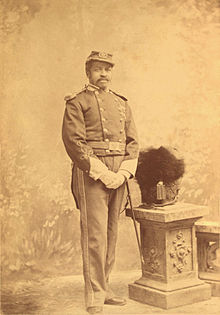Christian Fleetwood
| Christian Abraham Fleetwood | |
|---|---|

Christian Fleetwood
|
|
| Born |
July 21, 1840 Baltimore, Maryland |
| Died | September 28, 1914 (aged 74) Washington, D.C. |
| Place of burial | Columbian Harmony Cemetery, Washington, D.C. |
| Allegiance | United States of America Union |
| Service/branch |
U.S. Army (Union Army) National Guard |
| Years of service | 1863–1896 |
| Rank |
|
| Unit | 4th U.S. Colored Infantry Regiment |
| Battles/wars | |
| Awards | Medal of Honor |
| Other work | editor, musician, and politician |
Christian Abraham Fleetwood (July 21, 1840 – September 28, 1914), was an African American non-commissioned officer in the United States Army, an editor, a musician, and a government official. He received the Medal of Honor for his actions during the American Civil War.
Fleetwood was born in Baltimore on July 21, 1840, the son of Charles and Anna Maria Fleetwood, both free persons of color. He received his early education in the home of a wealthy sugar merchant, John C. Brunes, and his wife, the latter treating him like her son. He continued his education in the office of the secretary of the Maryland Colonization Society, went briefly to Liberia and Sierra Leone, and graduated in 1860 from Ashmun Institute (later Lincoln University) in Oxford, Pennsylvania. He and others published briefly the Lyceum Observer in Baltimore, said to be the first African American newspaper in the upper South.
With his wife Sara Iredell, whom he married on November 16, 1869, he led an active social life in Washington, D.C. Sara Iredell's grandmother, Louisa Burr, was the sister of Philadelphia abolitionist John (Jean) Pierre Burr and daughter of U.S. Vice President, Aaron Burr. Sara's maternal uncle, novelist Frank J. Webb, lived with the couple in Washington in 1870 while writing for Frederick Douglass' New Era. The couple had one daughter, Edith.
The Fleetwoods were well acquainted with most of the prominent African Americans of the period, many who frequently visited their residence. Members of Washington's black elite society presented Fleetwood with a testimonial in 1889.
...
Wikipedia
